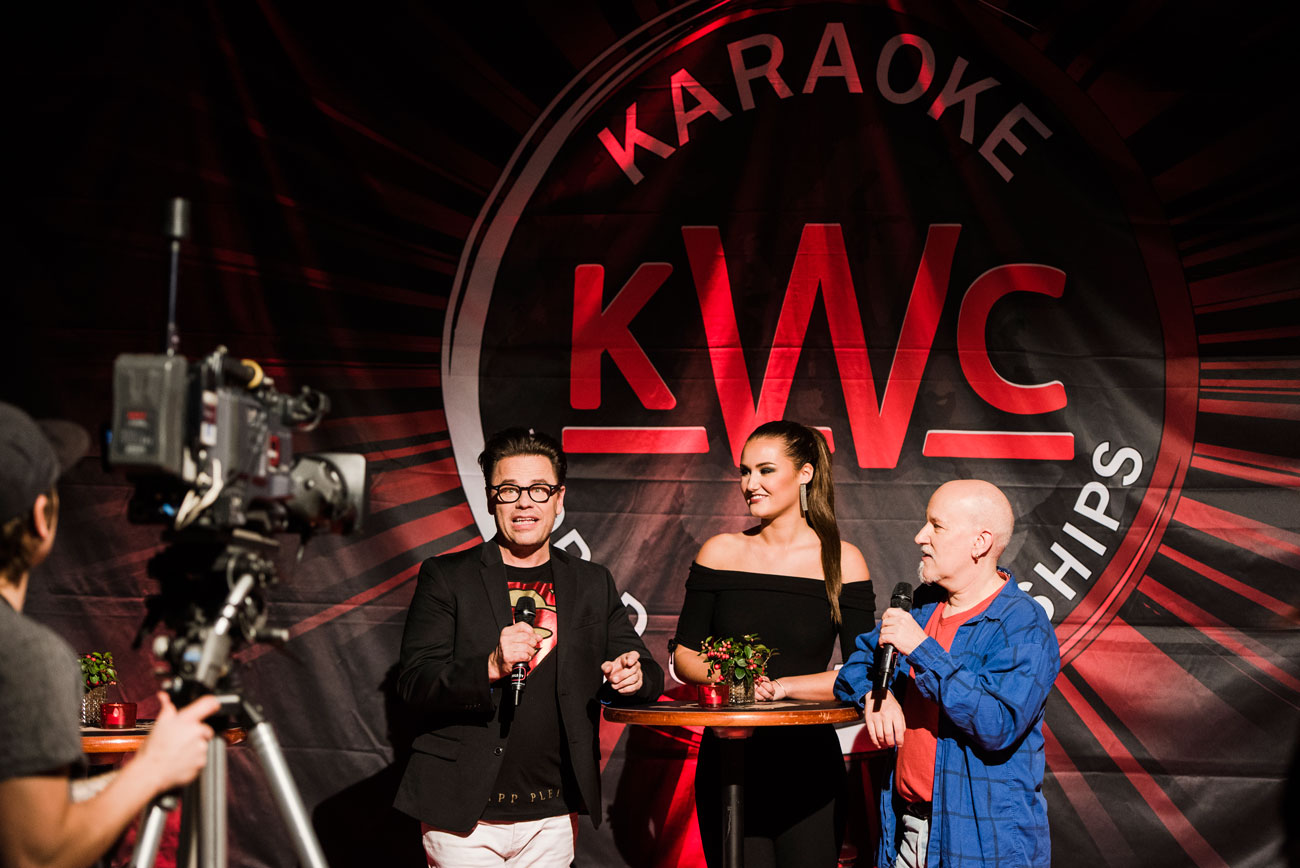You don’t know what a true vice grip feels like until you’ve been embraced by a six-foot-two Finnish metalhead. Dani’s long fingernails dig into my arm as he surveys the crowd below us with the intense cognitive absorption you normally only see in someone who’s just done a sizeable slug of coke.
Except there have been no narcotics. I’m not even drunk. We’re just singing “Sweet Child O’ Mine”.
Videos by VICE
“This is why I love to do the karaoke,” Dani shouts to me after we perform, flecking the shell of my ear with spit. We met about ten minutes earlier, when he pulled the back of his high-rise jeans down to display a warped tattoo of Axl Rose’s face on his hip meat. “Has anyone on this planet been feeling such release as right now?”
Having totally forgotten about me, Dani (go-to karaoke track: “Welcome To The Jungle” – Guns N’ Roses) lurches across the room to plug his next song into the iPad.

Think of karaoke and you’ll probably think of Japan. Those glass boxes set into skyscrapers where, for a reasonable fee, you can scream into a neon night that can’t hear or see you but you can see yourself and you look like a Lost in Translation extra and you’ve never felt more alive. Karaoke was invented there in the 1970s, used in hotels and bars as a go-between for drinking and interacting after work hours.
But karaoke spots can also be found in abundance in the activity’s lesser-known cultural home: Helsinki. It’s a small capital city with about 30 karaoke bars or clubs – one every few minutes walk in the centre – a figure difficult to pin down because the activity is so popular that pubs will just “have” machines they bring out. There is a metal karaoke bar. A gay karaoke bar. There is a public library with a karaoke booth. It is very possible that many Finnish people love karaoke even more than the Japanese.
“I used to think karaoke was just something for old men to do in bars, or [something] you did with your family at gatherings,” 25-year-old shop assistant Salla (“Chasing Highs” – ALMA) tells me during my first day in Helsinki. “My grandfather would always bring out the karaoke machine at home and sing on it. Now it’s become cool. It’d be normal for you and your friends to casually do it every Friday or Saturday night.”
I’m told by another Finn that “like the Japanese, we are shy and reserved” and don’t like to talk about feelings. It’s said offhand and in the same way Brits would habitually and accurately call themselves awkward and apologetic. “For some reason, karaoke makes us able to express ourselves more,” Salla says. “It makes us friendly and we can show more of ourselves.”
If you care about something, anything, it has to be done well. JoJo (“Stay With Me” – Sam Smith), a tattooed twenty-something-year-old who runs the event I’m in Helsinki for, later warns with a scathing look that there are “good” places and “bad” places to do karaoke. A bad place: “there is no host, just people putting on the songs themselves, nobody caring how it sounds, people so drunk there is no control and the sound system isn’t excellent”. Which sounds a lot like British karaoke. Karaoke booths? Pathetic. Self-service? Boring. “That is not nice, that is not my karaoke.”
“Culturally, we love to sing as a country and are serious about it,” she says and she’s not wrong. Finns will literally practice their go-to karaoke songs at home so they know all the words and can do them perfectly when they’re out. But there is seemingly a contradiction. “We don’t do it sober. Oh yes, Finns are drinking.” As for the Japanese, alcohol is a priority in de-stressing, lubricating those social exchanges and somehow, mystifyingly to enhance good karaoke performances.
JoJo grins and gestures to the black window we’re sat next to, marbled with condensation. “Look outside. It’s dark and cold eight months of the year. That’s eight months to drink and sing.”

I’m in Helsinki not just for brief karaoke-based chats with strangers, but for the 2017 Karaoke World Championships.
On Friday evening it’s the semi-finals of the competition, and I’m on a grey peninsula of land that couldn’t feel lonelier. The Championships are apparently somewhere on an industrial park that no woman should be walking around alone, and the cold wind off the Baltic Sea is biting cracks into my red hands. No one is here. No one would hear the screams.
And then suddenly, I hear them. I’d know those haunting cries anywhere: “Bring Me To Life” by Evanescence, miraculously one of my favourite karaoke songs to perform. This is a divine sign.
The Championships are held inside the Tapahtumakeskus Telakka, a space decked out like something your dad would do to the kitchen after a mid-life crisis – arcade games, shiny reds and pinks, angled spotlights – with an awards ceremony set-up at the back. Every competing country has a table facing the stage, which is furnished with a large monitor for the lyric videos. Members of the public can pay to watch at the back. There are three categories: male, female and duets. The hosts, Finland, and – of course – Japan are there, as are others, including Brazil, Canada, India and the Philippines. Notably, Britain is absent – further proof our country has lost its vital essence.
Thankfully, Ireland is here, represented by three brassy and brilliant women I later befriend. Elaine (“Hey Big Spender” – Shirley Bassey) is a mum and piano teacher in her forties who’d accidentally become the female rep for her fair country after doing karaoke pissed in a Dublin pub. Her mates, Louise and Maggie (“Purple Rain” – Prince and “I’m Gonna Be (500 Miles)” – The Proclaimers) are on the Bacardi from the off. I meet them in the secondary karaoke room installed for anyone to use. “Oh god, I’m just here for the laugh of it,” explains Elaine.
But how and why are any of these people here? It’s not exactly clear. You had to be the “best” karaoke performer in your country – however that’s decided – and then to have proved your worth in heats earlier in the week.

When I walk back into the main room there is a disheveled male contestant – Victor – dressed like Fat Mike, in a yellow and black stripy tie and pantaloon jeans, onstage. He sings “Pretty Fly for a White Guy” in an American accent, his Russian voice grappling awkwardly underneath the curve of the words. Back and forth he bounces, the chain on his jeans swinging like a metronome. “Give it to me babaaay,” he begs one last time.
Just as your mates would be thumping chests like virile gorillas, splashing their pints and slurring along for encouragement, in front of the stage is an area that anyone can trot into, pick up their country’s flag and start politely waving. Apparently there’s an official WhatsApp group chat in which attendees are asked to rally if a contestant has a particularly weak crowd. The Japanese male contestant didn’t leave, and kept a grin on his face, waving on through every song. I didn’t realise at the time but our Russian friend didn’t have many people there.
“I think it sucked. It needed more personality,” says a short bald American next to me. It turns out he’s a songwriter and vocal coach from LA named Tracy (“Iris” – Goo Goo Dolls) and was previously a judge of the competition. This year, he’s hosting the livestream. He tells me three times that he’s Finnish metal band Lordi’s vocal coach. He has one follower I know on Twitter, and that follower is Britney. “They defeat themselves, some of these performers,” he says. “There’s an after party every night, and they go out and party and drink and blow their voices out.”
I worry about Elaine, who – on the basis of her craic – may well have had a drink before her show.

Considering he’d been a judge, I ask Tracy what the panel is looking for. “Technique, stage presence, originality and song choice,” he says. “You can be a great singer with massive stage presence and pick the wrong song: game over. Game over. If you pick an obvious song? That’ll bomb. But if you crush it, maybe it won’t.” An obvious song? He starts singing “Georgia On My Mind” by Ray Charles, and keeps going for a while longer than I know what to do with.
As we chat, the “King Of Karaoke” – a small Indian man in a huge red leather jacket with shades hanging from the neck of his T-shirt – swaggers over. He tells me he’s the King Of Karaoke and that everyone calls him the King Of Karaoke. His real name is Savio D’Sa (“You And I” – Lady Gaga). “I’ve been in this game for years, from the 2000s to now,” he says, putting his glasses on, even though it’s dark inside. “It gets tiring, but I was basically responsible for spreading karaoke to the entirety of India.”

Savio’s outlandishness is quite something, but it’s nothing compared to the singers themselves.
There’s a Singaporean female contestant in full red pleather and sparkling nine-inch boots singing something in her first language that segues into “Lady Marmalade” and ends in the splits; a Scandi Chad Kroeger with goatee and mirrored aviators singing Audioslave, who, upon noticing my camera pointed at him, begins eye-fucking it like a true karaoke champ; a Finnish former champion dressed all in black who sings Frozen’s “Let It Go” in Finnish.
His face, body and long coarse ponytail are so utterly mismatched from the voice and tenderness of the song it’s a wonder to see. This is what Tracy meant by a good song choice. Pale and sweating profusely, he flips his chin at the audience. At the end of the first chorus, he throws his hairband out, tossing his mane, a glorious moment of triumph to the audience’s “oooo, ahhh”. At the close, he turns, flings a teary, scorned look over his shoulder and half whispers-half kisses the final line in English, “The cold never bothered me anyway”.

Between songs, all-American suited and booted host Michael (“White Wedding” – Billy Joel) hypes up the next contestant. Backstage, he tells me of his dream to expand the competition. He’d bought it after the old owners got too old because he couldn’t bear to see it die. He wants the British to pull their finger out and start a team. I strongly consider it. Elaine, Louise and Maggie start hyping me up, whooping, telling me I’m great even though they haven’t seen me sing. But that’s it, isn’t it? Anyone can be great at karaoke.
At 10PM, the finalists are announced. Elaine’s through: we have more Bacardi to celebrate. Everyone congratulates each other with the appropriate hug, air kiss or bow, according to their cultural customs, and grins and claps as they themselves are voted out. Not a sign of resentment on anyone’s face. This is what karaoke does. Karaoke is peace and karaoke is harmony.
Until the finals.

What is karaoke? For the first of many times this weekend, I try to work it out. It’s not the same as an open mic night where you sing your own songs, with no recorded track and a level of professionalism expected (for instance, actually knowing the words). Neither is it a Stars in Their Eyes-type scenario, since there’s no pressure to perform the song like the artist. It’s not drag, because, apart from one contestant dressed like a queen and a couple of guys singing Whitney Houston numbers, there isn’t anything political or subversive about what we’ve seen so far.
I’m not alone in my confusion: no one knows what karaoke is. Or, at least, everyone has conflicting ideas. Some countries go for gags and flamboyance. Canada and America, for example, are full Glee club, whipping out Broadway numbers. Others perform folk songs from their country in traditional dress. Every act is diverse to the point that they’re completely incomparable. I wonder how the English-speaking judges will avoid unconscious bias towards lyrics they understand or melodies that are closer to the pop songs they’re familiar with.
The finals become, for a Brit, a slog. Banter and alcohol-fuelled performers diplomatically weeded out, all that remains – bar Elaine – are the serious singers pacing around, sipping lukewarm honey and lemon water, and getting back-rubs from their vocal coaches. Every imperceivable misstep – forgetting to glance in the direction of the judges, not enough vibrato on a single note – produces fury and yelps in the make-up room. I see one woman smash down a make-up bag so hard that its contents fly out across the floor.
The eyes of Fatima Suarez (“Mexico Lindo Y Querido” – Ana Gabriel) brim with tears that match her sparkly sombrero. This is the first time Mexico decided to join the competition giving the 29-year-old her shot at the big time. “I’d sing all day every day with my daughter at home,” she tells our translator. “But then I hired the 2014 karaoke winning champion to be my vocal coach and got very serious.” What will it mean for her to win here tonight? She lowers her head. “To win would be the greatest sign I need to know that I will dedicate my life to music 24-7. To wherever it is possible to go with my singing: I will.”
Ballad after ballad after ballad, I become desensitised to the blooming emotions, the love, the heartbreak.

Ireland are my only hope. Elaine cruises into a big cock-rock number, microphone swinging, tongue out, horns to the crowd. They aren’t the best vocals out of the remaining bunch, but there are balls. Colossal, swollen balls, bigger than anyone else’s – and god, it looks fun.
Sadly, it isn’t enough. Elaine’s out. But she couldn’t care less, because she’s had a bloody laugh and that was the point, wasn’t it. I say I’m proud of my mum, and Maggie calls me a cheeky cow and says we’re all sisters. Elaine and Maggie both groan loudly when the next competitor kicks into another love song, and I find myself joining in.
Where, I wonder, is the fire, the devil that strikes your heart when you scream along in a booth with your mates to “Let Me Entertain You”? That wildness that comes from fully letting go, from embracing being bad. Had the Karaoke World Championships misunderstood karaoke or had I?

Eventually, the judges announce the winners and they cry and cry and cry. Everyone steps forward holding their flags at awkward angles, and the bulbs flash, and family members weep too, and suddenly it’s time to recalibrate and remember we’re a global family and perform extremely long saccharine renditions of songs, the type that round off musicals and leave you itching to leave.
Me and the Irish lot do exactly that, escaping on a karaoke-bus, warming up with “In the Shadows” by Finnish band The Rasmus, and falling out at an afterparty.
It’s at these bars that you realise Finns love getting absolutely mortal. The queue time for karaoke is two hours long, so all there is to do is drink and go buck-wild for anyone performing. I smack the table with a glow-up foam rod branded with the Karaoke World Championships’ logo, and a married couple extend a sincere invitation to come back to their sauna and do the same to them.
It’s outside the friendly competition of the championships, where the real amateurs are, that true karaoke can be found. Goateed Finns take off their tops, revealing belly tattoos, to beat out metal numbers. There is no hint of embarrassment, just full throttle earnestness.

For the British – who aren’t cool enough to show up to the competition – I go up in a Hello Kitty hoodie, seven pints deep, and slut-drop to the Britney version of “I Love Rock ‘N’ Roll”. The middle-aged male French contestant in a jazzy suit finds a second mic for backing vocals, and we work the crowd. I go down to audience level to find my new Irish mates, and we sing into the mic together. I try to laugh, but I can’t, because we’ve all lost our voices.
This is not a skill that can be evaluated. The Championships, ironically, reinforced the fact that rules can’t – or shouldn’t – exist when it comes to karaoke.
Karaoke isn’t a style, it’s a chance to be the best singer you can be or a free pass to be a tit. It’s a therapeutic vessel for escape. You can cut through the noise and feel listened to for three minutes and 45 seconds, but simultaneously disappear into someone else’s song, into someone else who wouldn’t bat an eyelid at jumping on the back of a stranger as you ride him consensually across a sticky floor. It’s sexual and visceral and also neutered and platonic. It’s as innocent and hearty as dancing to “Take On Me” at your aunty’s wedding. It’s attention-seeking, but everyone is seeking attention. There is no hero worship or hierarchy. After the outro, it’s onto the next turn. The world is forgotten and nothing exists out of that living room, booth, stage, venue.
Waiting for my flight home, I see I’ve been added to a WhatsApp group by the Irish women, and sent a video of the four of us all singing into the microphone together, looking ecstatic. The message is signed off with an “E” and a heart emoji. I look like an idiot and it’s fantastic.
More
From VICE
-

Niels van Iperen/Getty Images -

Axelle/Bauer-Griffin/FilmMagic/Getty Images -

Screenshot: Ubisoft -

(Photo by Max2611 / Getty Images)
